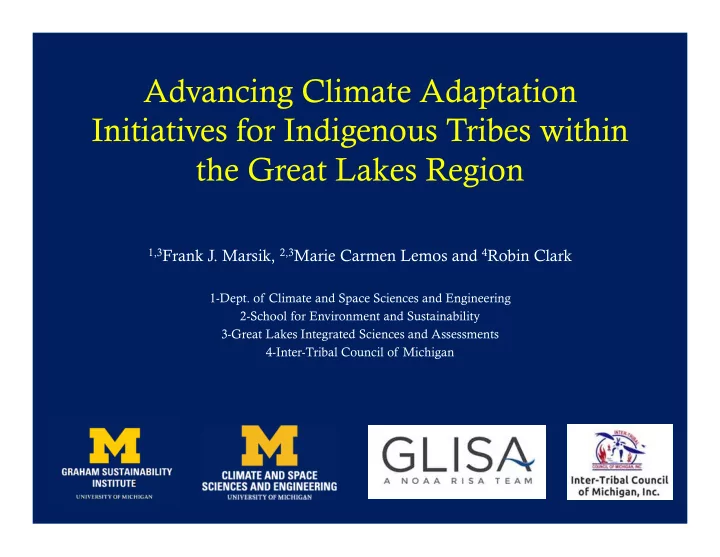

Advancing Climate Adaptation Initiatives for Indigenous Tribes within the Great Lakes Region 1,3 Frank J. Marsik, 2,3 Marie Carmen Lemos and 4 Robin Clark 1-Dept. of Climate and Space Sciences and Engineering 2-School for Environment and Sustainability 3-Great Lakes Integrated Sciences and Assessments 4-Inter-Tribal Council of Michigan
Motivation Assist the Great Lakes Tribal Nations in the protection of the environment and their traditional ways of life in light of a changing climate Tribal Fisheries Clan Animals Medicinal Plants Natural materials for crafts Ancient burial grounds and sacred sites Great Lakes Tribal Nations expressed interest in a regional climate camp Source: Inter-Tribal Council of Michigan
Engaged Partner Inter-Tribal Council of Michigan (ITCMI) Robin Clark – Primary Contact • GLISA had previously supported other ITCMI efforts • • Tribal Climate Change Vulnerability Assessment and Adaptation Plan development (2016) Source: Inter-Tribal Council of Michigan
Working with Engaged Partner ITCMI’s Expressed Needs Assist with facilitation of a workshop to: • • Follow-up on progress related to 2016 Vulnerability Assessment • Help Tribal Nations prepare for the potential impacts of extreme precipitation events in their communities • Example: Bad River Band – July 2016 Source: http://www.badriver-nsn.gov/ Graham Sustainability Institute’s Catalyst Grant program supports the facilitation of workshops which build partnerships and determine next steps.
Tribal Climate Workshop When: October 9-11, 2017 Where: Bay Mills Community College Who: Tribal Nations from Michigan and other Great Lakes States Workshop design: • Monday: Each Tribal Nation will share their stories related to successes and challenges • experienced in developing climate adaptation plans • Tribal environmental experts will present their research Tuesday: • Extreme precipitation : personal experiences, introduction to “Game of • Floods” training exercise and one potential adaptation planning tool • Wednesday: • Impact of the impact of climate change on the role of women caretakers of water and as educators
Working with Engaged Partner For success, one needs to understand, and be sensitive to, the unique challenges of the partner For Tribal Nations, challenges in environmental and climate adaptation planning have included: Self-governance • Protection of Traditional Ecological Knowledge (TEK) • • Informed, prior consent • History of lack of inclusion of Tribal Nations in all phases of environmental planning • Building bridges within individual Tribal Nations
Working with Engaged Partner Benefits of working with engaged partner Working with Inter-Tribal Council of Michigan has… • Aided in trust-building between the project team and Tribal Nations • Insured the needs of the Tribal Nations have been put first ITCMI has first hand knowledge of these needs • • Insured local Tribal expertise is included in the workshop
Working with Engaged Partner Benefits of working with engaged partner Collaboration insured that … Project tasks directly addressed clearly-stated needs of the • partner Project deliverables were designed to be actionable by project • partners • Clearly defined needs and deliverables made for a stronger and more focused proposal!
Student Opportunities Logan Dreher – Brown University • Doris Duke Conservation Fellow Assisted in review of current tribal adaptation • planning efforts within Great Lakes Regions • Obtained understanding of how of Indigenous populations creatively address environmental changes in their communities Ellie Masters – Oberlin College Supported by outside funding • Assisted in development of community • education/outreach materials for Tribal youth
Recommend
More recommend